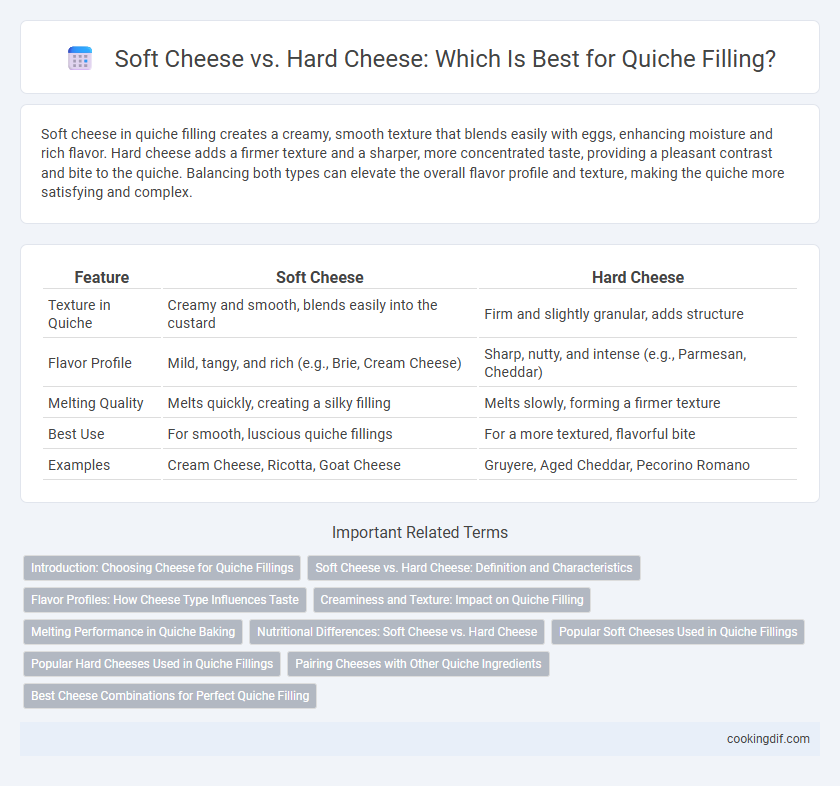Soft cheese in quiche filling creates a creamy, smooth texture that blends easily with eggs, enhancing moisture and rich flavor. Hard cheese adds a firmer texture and a sharper, more concentrated taste, providing a pleasant contrast and bite to the quiche. Balancing both types can elevate the overall flavor profile and texture, making the quiche more satisfying and complex.
Table of Comparison
| Feature | Soft Cheese | Hard Cheese |
|---|---|---|
| Texture in Quiche | Creamy and smooth, blends easily into the custard | Firm and slightly granular, adds structure |
| Flavor Profile | Mild, tangy, and rich (e.g., Brie, Cream Cheese) | Sharp, nutty, and intense (e.g., Parmesan, Cheddar) |
| Melting Quality | Melts quickly, creating a silky filling | Melts slowly, forming a firmer texture |
| Best Use | For smooth, luscious quiche fillings | For a more textured, flavorful bite |
| Examples | Cream Cheese, Ricotta, Goat Cheese | Gruyere, Aged Cheddar, Pecorino Romano |
Introduction: Choosing Cheese for Quiche Fillings
Soft cheeses like cream cheese, ricotta, and goat cheese create a smooth, creamy texture in quiche fillings, enhancing moisture and subtle tanginess. Hard cheeses such as cheddar, Gruyere, and Parmesan contribute a sharper, more robust flavor and a firmer texture that holds up well during baking. Selecting the right cheese balance ensures an optimal blend of richness, meltability, and flavor depth for a perfect quiche.
Soft Cheese vs. Hard Cheese: Definition and Characteristics
Soft cheese, such as cream cheese, ricotta, or goat cheese, offers a creamy texture and mild flavor that blends smoothly into quiche filling, providing moisture and richness. Hard cheese like cheddar, Swiss, or Gruyere delivers a firmer texture and sharper, more intense flavor that enhances the overall taste with a slight tang and meltable quality. Choosing between soft and hard cheese affects the quiche's consistency and flavor profile, with soft cheeses yielding a smooth, velvety filling and hard cheeses imparting a distinctive, savory bite.
Flavor Profiles: How Cheese Type Influences Taste
Soft cheeses like ricotta or cream cheese provide a creamy, mild flavor that enhances quiche fillings with a smooth texture and subtle tanginess. Hard cheeses such as Gruyere or cheddar contribute a sharper, more pronounced taste, adding depth and a slightly nutty or savory complexity to the dish. Choosing between soft and hard cheese significantly impacts the quiche's overall flavor profile, balancing richness and intensity to suit different culinary preferences.
Creaminess and Texture: Impact on Quiche Filling
Soft cheese, such as cream cheese or ricotta, enhances quiche filling with rich creaminess and a smooth, velvety texture that melts evenly during baking. Hard cheeses like Gruyere or Parmesan contribute a firmer structure and a slightly grainy texture, adding depth and a subtle sharpness to the filling. Combining both cheese types improves flavor complexity and balances creaminess with a pleasing, resilient texture in the final quiche.
Melting Performance in Quiche Baking
Soft cheese such as cream cheese or ricotta melts smoothly in quiche filling, creating a creamy texture that blends well with eggs and vegetables. Hard cheeses like Gruyere or Parmesan provide a sharper flavor and melt into a slightly firmer consistency, contributing a desirable stretch and golden crust on top. Optimal melting performance in quiche baking combines soft cheese's creaminess with hard cheese's enhanced flavor and structure.
Nutritional Differences: Soft Cheese vs. Hard Cheese
Soft cheese in quiche filling, such as cream cheese or ricotta, provides higher moisture content and a creamier texture, with lower protein and calcium levels compared to hard cheeses. Hard cheese options like cheddar or Parmesan contribute a denser, more concentrated source of protein, calcium, and fat, enhancing both flavor and nutritional density. Choosing soft cheese may reduce calorie intake, while hard cheese offers more essential minerals beneficial for bone health.
Popular Soft Cheeses Used in Quiche Fillings
Popular soft cheeses used in quiche fillings include cream cheese, ricotta, and goat cheese, which provide a smooth, creamy texture that blends well with eggs and vegetables. These cheeses enhance the quiche's moisture and add a mild to tangy flavor profile, making the filling rich yet delicate. Unlike hard cheeses that offer a sharper taste and firmer texture, soft cheeses ensure a tender, velvety consistency that complements a variety of savory ingredients.
Popular Hard Cheeses Used in Quiche Fillings
Popular hard cheeses used in quiche fillings include Gruyere, Parmesan, and aged Cheddar, prized for their rich flavor and excellent melting properties that enhance the dish's texture. These cheeses provide a robust, nutty taste and a firmer consistency compared to soft cheeses like Brie or cream cheese, which yield a creamier filling. Incorporating hard cheeses ensures a balanced blend of sharpness and depth, crucial for a savory and satisfying quiche.
Pairing Cheeses with Other Quiche Ingredients
Soft cheese such as ricotta, cream cheese, or goat cheese blends smoothly into quiche fillings, enhancing creaminess and complementing delicate ingredients like spinach, herbs, or mushrooms. Hard cheeses like Gruyere, cheddar, and Parmesan add a sharper, nuttier flavor and firmer texture that pairs well with robust components such as bacon, caramelized onions, or kale. Choosing the right cheese ensures a balanced taste and texture, elevating the overall flavor profile of the quiche.
Best Cheese Combinations for Perfect Quiche Filling
Soft cheese like ricotta and cream cheese adds creamy texture and mild flavor to quiche filling, balancing richness without overpowering other ingredients. Hard cheeses such as Gruyere and aged cheddar contribute sharpness, depth, and a slightly nutty taste, enhancing the overall complexity of the quiche. Combining soft cheeses with hard varieties results in a perfectly balanced filling that is smooth yet flavorful, making cheeses like goat cheese with Parmesan or cream cheese with Swiss ideal choices for quiche recipes.
Soft cheese vs hard cheese in quiche filling Infographic

 cookingdif.com
cookingdif.com